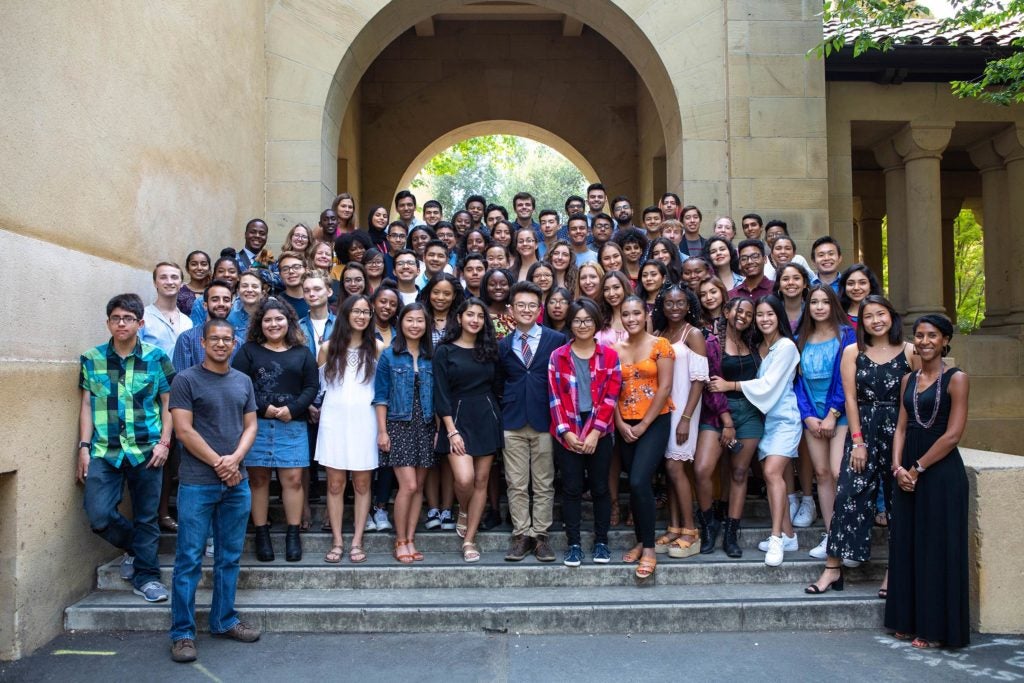September 18, 2018
Leland Scholars Program: preparing for success

In August I spent some time getting to know this year’s class. As always, the students are impressive — exceptionally bright, curious, accomplished, and enthusiastic. Most of our allotted hour was spent answering their questions, which ranged from questions about my career and my views on specific issues to queries about all things Stanford.
I was impressed to get questions that probed deeply into both my experiences and my role in Stanford’s administration. Some questions were focused on my experiences as a female physics student in an era when there were very few women in the field. Other questions explored the role of Stanford as an institution in benefitting society more broadly. I found the discussion deeply engaging and inspiring.
My goal for this time with the students is simple: I want them to feel welcome. I acknowledge that they likely had many options for college and I let them know how grateful we are that they chose Stanford. I remind them why we admitted them — because we believe they have the potential to make the most of the incredible opportunities here and we’re convinced they will shine and be successful.
This last message is especially important for the students to hear. Many incoming undergraduates have told us they feel anxious about coming to Stanford. They’re concerned about succeeding academically, worried about making friends, and questioning if they “belong” here.
The Leland Scholars Program helps address these concerns.
To get a head start on the fall quarter, the students are enrolled in a special three-credit course that includes chemistry and writing classes. They also participate in a host of seminars, presentations, and activities that introduce them to Stanford, acquaint them with faculty, familiarize them with campus resources, and build community.
After their summer together, the Leland scholars continue to draw on the resources provided by LSP, in particular the LSP Council, which is made up of upperclass students who previously participated in the program. They also participate in a two-quarter first year college transition seminar along with other Stanford students who identify as low-income or first in their family to attend college.
To give an idea of what students think of the program, I’ll share a few testimonials that we’ve received from previous Leland scholars:
“LSP was an amazing experience that made me feel so much more comfortable coming into Stanford. I feel like I can succeed — fully aware that I am going to struggle. Struggling is okay, and there are ways to get around it. My falls will not define me; the manner by which I get back up and persevere will.”
“This program gave us a window into college. It gave us mentors and it gave us friends. It helped quell our anxieties . . . overall, this program set up the best support system we could ask for.”
“The greatest benefit we each gained from LSP is finding a family.”
While the program clearly has tangible benefits for the students, the university also gains. Our community is enriched by this group of diverse, talented, and motivated students who are better prepared to participate fully in campus life.
Our undergraduate population is increasingly diverse. This fall, 18 percent of our incoming first-year class are the first in their families to attend college. To help these students thrive at Stanford, we need to provide more resources to support their academic and social transitions, build community, and facilitate personal growth.
The Leland Scholars Program is a good first step for life at Stanford. As any athlete or performer will tell you, preparation is key to success. Being prepared calms the nerves, instills confidence, and builds resilience.
I tell incoming undergrads that in pursuing their education, it’s important to define what you mean by success. It can’t just be about earning As, it has to be about personal development.
I tell them that success is not that you become what somebody else thinks you ought to become. Success is that you develop into the person that you want to become. From my delightful encounter with the 2018 LSP students, it’s clear to me that they are well on their way!